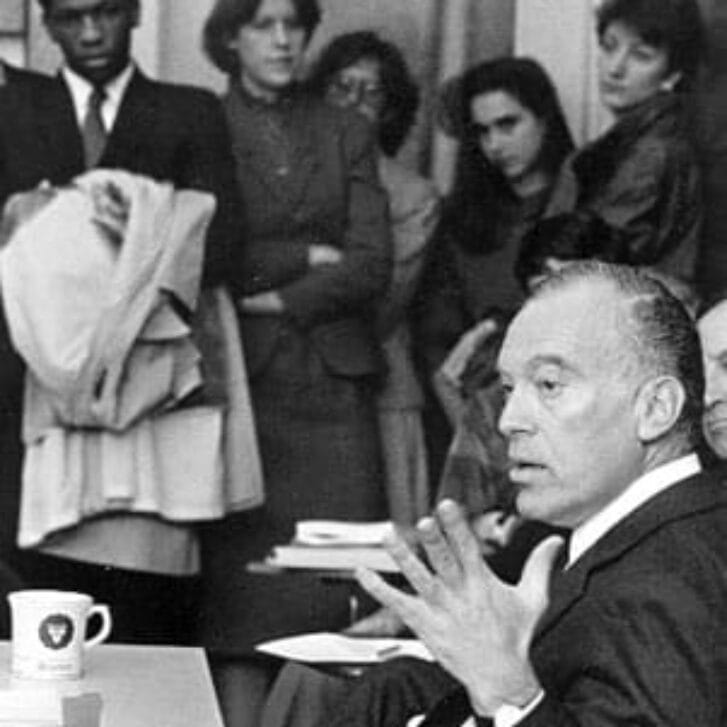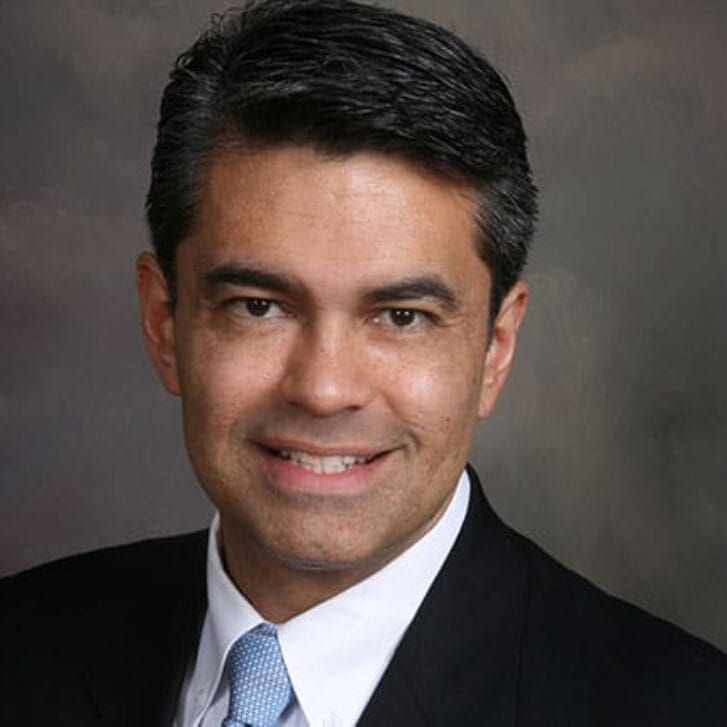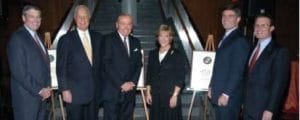
Dean Medal Awarded to Boisi, WG’71, Tarnopol, W’58, and Former Dean Gerrity
Wharton Awards Dean’s Medals for Outstanding Leadership
The Wharton School has awarded its Dean’s Medal to alumni leaders Geoffrey Boisi, WG’71, and Michael Tarnopol, W’58, and former Dean Thomas P. Gerrity. The medals were presented at this fall’s Campaign for Sustained Leadership Finale for their extraordinary efforts during the School’s first capital campaign, which raised nearly $450 million, the largest campaign in business school history.
The Campaign was launched in July 1997 under the leadership of alumnus Jon M. Huntsman and Campaign co-chairs Boisi and Tarnopol. Working with then Dean Gerrity, they laid the groundwork for Wharton’s record-breaking campaign.
“In addition to being innovative leaders in their respective fields and communities, Tom Gerrity, Geoff Boisi and Mickey Tarnopol have contributed an exceptional amount of time and resources prior to, and during the Campaign, to help the School ensure that future generations of Wharton graduates will be able to carry on their spirit of purpose and achievement,” said Dean Patrick Harker.
Wharton Global Alumni Forums
This year, Wharton will host Global Alumni Forums in three cities: Moscow (May 20-22), Shanghai (June 3-6) and Mexico City (June 24-26).
The Forums, which were previously known as the Regional Alumni Meetings, have been renamed to better reflect the true nature of the global Wharton community.
“Our alumni no longer do business simply on a regional basis” said Dean Patrick Harker. “They go where the opportunities are most rewarding, and constantly expand the geographical dimensions of their businesses.”
At each location, local organizing committees under the leadership of senior alumni have planned professionally stimulating and personally rewarding activities, including distinguished keynote speakers, lively panel discussions, intriguing cultural excursions, and relaxed social activities. For more information on the Global Forums, visit www.wharton.upenn.edu/alumni/forums.
White House Names Two Alumnae as Fellows
Two Wharton alumnae have been selected for the 2003-04 White House Fellows program. Eileen Stephens, WG’03, and Cathy Taylor, WG’98, began their one-year appointment in the program on September 1.
The White House Fellows Program is the nation’s most prestigious program for leadership and public service. Selection as a White House Fellow is highly competitive and based on a record of remarkable professional achievement early in one’s career, evidence of leadership potential, a proven commitment to public service, and the knowledge and skills necessary to contribute successfully at the highest levels of the Federal government. White House Fellows typically spend one year in the program, and often repay the privilege by working after the Fellowship year as private citizens who contribute to the nation as future leaders. Dean Patrick Harker was a White House Fellow in 1991-92 as was Management Professor William Hamilton in 1973-74.
Eileen Stephens was an active student leader prior to her appointment as a White House Fellow. She co-founded the University’s Social Impact Management Initiative, a partnership to explore the potential of business to address broader societal concerns. Stephens also was a winner in the 2002 Wharton Business Plan Competition.
Cathy Taylor was president of the Wharton Graduate Association (WGA) and spearheaded the creation of Wharton’s Volunteer Day during her time on campus. Prior to becoming a White House Fellow, she was a vice president, Investment and Business Development, with American Express, where she also managed the division’s Mentor Program. Taylor also founded LeadingEdge Partners, a community organization that provides leadership training to students in New York City public schools.

Paul Green
Professor Emeritus Paul Green wins new MIT Sloan Marketing Award
Paul Green, professor emeritus at the Wharton School, was named the first recipient of the new MIT Sloan School of Management Buck Weaver Award for marketing.
The award was established at MIT Sloan and sponsored by General Motors Corp. to honor individuals who have made important contributions to the advancement of theory and practice in marketing science.
The award was presented to Green in September by C. J. Fraleigh, GM executive director of corporate advertising and marketing, and MIT Sloan Professor Glen Urban, at a conference at MIT in Green’s honor.
Green was the unanimous choice from a list of 25 nominees from business and academia.
“Green was a pioneer in developing and applying conjoint analysis, multidimensional scaling, and Bayesian decision theory to marketing,” said Urban. “He is an excellent example of a balance of theory and relevance.”
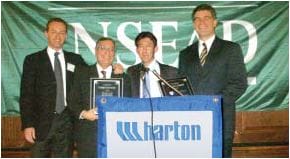
Ryan, INSEAD Dean Hawawini, Beck, WG’87, Dean Harker
In November, Wharton and INSEAD alumni met at the Penn Club of New York to share an entrepreneurial panel followed by talks from Wharton Dean Patrick Harker and Dean Gabriel Hawawini of INSEAD.
Attendees were welcomed by Wharton New York Club President Kenny Beck, WG’87, and Kevin Ryan, president of the INSEAD Alumni Association of the U.S.
In all, 150 attended the event, with 22 percent from INSEAD, which has about 200 alumni in the New York metro area. Wharton has 16,000 alumni there.
“This was the first joint event hosted by Wharton and INSEAD alumni, and it marks a new level of cooperation among the alumni of both schools,” said Beck. “It was probably the beginning of Alumni Network Plus for both schools.”
New Ethics and Legal Studies PhD Program
Wharton has launched a new doctoral program in ethics and legal studies. The PhD in Ethics and Legal Studies has been designed so that anyone who completes the program will also have one foot in another major discipline, such as marketing, finance, accounting, or management.
Graduates of the program will be prepared to teach this second area of expertise, as well as ethics, law, and social responsibility. This should make them more attractive to the university job market.
“The area of ethics is thoroughly interdisciplinary,” explains Thomas Donaldson, professor of legal studies and coordinator for the new PhD program. “Here at Wharton we have people approaching ethical topics from different directions – ethics in marketing, ethics in financial institutions, or ethics in economics. The subject can relate to any of the traditional silos around which business schools are built.”
The department expects to attract a wide variety of applicants — those with law or business backgrounds, as well as those who have studied ethics, philosophy, sociology, or psychology.
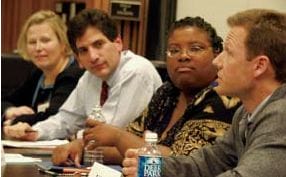
Engebretson, WG’83, Gunther, WG’85, Lowe, WG’98 and Marcum, WG’01
The second annual Wharton Social Impact Management (SIM) Symposium, “Building Sustainable Enterprises,” was held on campus in October. During the course of the event, students gathered with faculty and guest speakers to share goals and experiences with each other.
After a welcome from Wharton finance professor Andrew Metrick, attendees were addressed by Georg Kell, senior adviser to the Secretary General of the United Nations, on “Corporate Citizenship and the United Nations Global Compact.”
The symposium also featured an alumni panel on using one’s experience in the ‘business’ of social change. Panelists included Dr. Kathryn J. Engebretson, WG’83 (William Penn Foundation), Andrew Gunther, WG’85 (Rock Creek Capital), Vanessa L. Lowe, WG’98 (The CDFI Fund), and Ed Marcum, WG’01 (Global Education Partnership).
After a networking break, a Wharton Leadership Lecture on the business of social change was delivered by Lynn Taliento, co-founder and leader of McKinsey’s nonprofit practice.
“The widening inequalities in the world, ethical cracks in capitalism, and growing appreciation for how business can contribute to social change – all call for business schools to dedicate resources to social impact management,” says SIM director Dave Levin, WG’04.
Whitney Young Conference Celebrates 30 years
In December, Wharton’s African American MBA Association (AAMBAA) celebrated the thirtieth anniversary of its annual Whitney Young Conference. To mark the occasion and commemorate the contributions of Wharton’s AAMBAA, Philadelphia Mayor John Street declared the week of the conference “Wharton African American MBA Association Week.”
The Whitney Young Conference is one of the oldest of its kind and a major contribution by AAMBAA to the Philadelphia community. The event honors the memory of civil rights activist and National Urban League leader Whitney M. Young. The conference has grown to a three-day event with attendance at well over 750 students, business professionals, alumni, educators, and corporate representatives from around the world.
This year’s conference included keynote addresses from Bob Johnson, founder and CEO of BET, Slivy Edmonds Cotton, WG’79, owner and senior managing director of The Edmonds Group, and Dr. Michael Eric Dyson, critically acclaimed author, media commentator, and University of Pennsylvania Avalon Professor of Humanities.
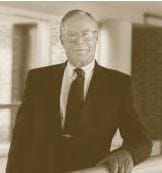
Hattersley
The Wharton Legacy Circle has been renamed for Gordon B. Hattersley, Jr., WG’54. Mr. Hattersley served as a member of the Undergraduate Executive Board for many years, and as a member of the School’s Board of Overseers. He was also active in the Wharton Alumni Association and the University of Pennsylvania General Alumni Society in addition to many other not-for- profits and charities in Philadelphia and Paoli, Pa.
Encouraged by his father, Gordon, Sr., W’24, he received his MBA from Wharton in 1954 following his undergraduate experience at Yale. An Air Force veteran, he began his business career with Uniform Tubes, Inc. in 1957. With his business partner, Bruce Mainwaring, C’47, he founded UTI Corporation in 1967, serving later as president and, from 1994 to 2000, as chief executive officer.
His support of Wharton during his lifetime included decades of support of the Wharton Fund and gifts of financial aid for high school students attending the School’s Leadership in the Business World program. He and his wife, Beverly, helped Wharton build new, world-class teaching facilities with major gifts to name prominent spaces for his father in the Steinberg Conference Center and Huntsman Hall.
Mr. Hattersley’s generous support of Wharton extended after his death. His unrestricted estate gift to the School is the largest such gift in the School’s history. “Gordon demonstrated thoughtful and creative leadership throughout his business career, as well as in his service to the community,” said Dean Patrick Harker. “His tireless involvement and generous support of the School exemplify the vision and expectations of our founder, Joseph Wharton. I am very pleased to rename the Wharton Legacy Circle for Gordon.”
The Gordon B. Hattersley, Jr. Society recognizes all alumni and friends who have provided for Wharton’s future through life income, bequest, retirement plan, and other estate and planned gifts.






















